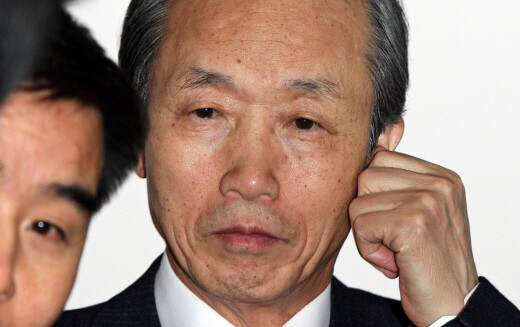hankyoreh
Links to other country sites 다른 나라 사이트 링크
Chief Justice Lee voices his comittment to protecting judicial independence

Chief Justice Lee made clear on Wednesday his intention to protect judicial independence.
Meeting with reporters on his way to work, Lee was asked about the growing controversy over court decisions. Lee responded by saying the Supreme Court plans to protect the independence of the judiciary. Oh Seok-jun, spokesman for the Supreme Court, warned against exaggerating the chief justice’s meaning, explaining that it was just a statement of principle. Inside and outside the court, however, the comments are being taken as being indicitive of Lee’s concern regarding comments by ruling Grand National Party (GNP) floor leader Ahn Sang-soo and others, who have criticized the constitutionally-guaranteed independence of judges and even Lee’s personnel decision within the judiciary.
While painting the acquittal of Democratic Labor Party (DLP) Chairman Kang Ki-Kab in ideological overtones, GNP floor leader Ahn Sang-soo on Wednesday continued to press Supreme Court Chief Justice Lee Yong-hoon, virtually demanding Lee to resign.
In the first meeting of a special GNP judicial reform committee Wednesday morning, Ahn said the public feels the ideologically biased decisions of some judges are hard to understand, and criticism has arisen that the court are protecting leftists. Ahn said Lee, whom he accused of creating a situation in which unfair, left-wing decisions were being made, should make clear his position regarding this and accept due responsibility. This marks the first time the leadership of the ruling party has called upon the sitting head of the court to take responsibility. Ahn is also calling for the end of judges’ membership in ‘ideological associations,’ such as the Our Law Research Association, the appointment of individuals with legal experience as judges and the reform of prosecutors and lawyers.
The GNP is also demanding general reform of the personnel system for justices, including strengthening conditions for appointments and adopting an evaluation system. Lawmaker Son Beom-gyu, who sits on the committee, said, “We should not appoint justices every ten years who, from the perspective of national unity, are unacceptable by healthy social standards.” Lawmaker Yeo Sang-kyoo is calling for the exclusion of ideologically biased judges from criminal trials, the adoption of evaluations for reappointment and the rejection of justices who fall in the lowest percentile of the evaluations. Inside and outside the courts, there has been criticism that the strengthening of personnel ratings for justices would simultaneously weaken the autonomous decision making capabilities by justices and bureaucratize judges.
Meanwhile, there is also criticism from within the GNP regarding moves by the party for so-called “judicial reform.” Lawmaker Kim Song-sik says it is problematic for a party to mention merely the fundamental nature of the independence of the judiciary over a decision. He says for a party to act as if it were pulling up the court by its roots just because it disagrees with a decision could, instead, harm the stability of the law.
Please direct questions or comments to [englishhani@hani.co.kr]
Editorial・opinion
![[Editorial] Penalties for airing allegations against Korea’s first lady endanger free press [Editorial] Penalties for airing allegations against Korea’s first lady endanger free press](https://flexible.img.hani.co.kr/flexible/normal/500/300/imgdb/original/2024/0502/1817146398095106.jpg) [Editorial] Penalties for airing allegations against Korea’s first lady endanger free press
[Editorial] Penalties for airing allegations against Korea’s first lady endanger free press![[Editorial] Yoon must halt procurement of SM-3 interceptor missiles [Editorial] Yoon must halt procurement of SM-3 interceptor missiles](https://flexible.img.hani.co.kr/flexible/normal/500/300/imgdb/child/2024/0501/17145495551605_1717145495195344.jpg) [Editorial] Yoon must halt procurement of SM-3 interceptor missiles
[Editorial] Yoon must halt procurement of SM-3 interceptor missiles- [Guest essay] Maybe Korea’s rapid population decline is an opportunity, not a crisis
- [Column] Can Yoon steer diplomacy with Russia, China back on track?
- [Column] Season 2 of special prosecutor probe may be coming to Korea soon
- [Column] Park Geun-hye déjà vu in Yoon Suk-yeol
- [Editorial] New weight of N. Korea’s nuclear threats makes dialogue all the more urgent
- [Guest essay] The real reason Korea’s new right wants to dub Rhee a founding father
- [Column] ‘Choson’: Is it time we start referring to N. Korea in its own terms?
- [Editorial] Japan’s rewriting of history with Korea has gone too far
Most viewed articles
- 160% of young Koreans see no need to have kids after marriage
- 2Presidential office warns of veto in response to opposition passing special counsel probe act
- 3Hybe-Ador dispute shines light on pervasive issues behind K-pop’s tidy facade
- 4Months and months of overdue wages are pushing migrant workers in Korea into debt
- 5[Editorial] Penalties for airing allegations against Korea’s first lady endanger free press
- 6Japan says it’s not pressuring Naver to sell Line, but Korean insiders say otherwise
- 7OECD upgrades Korea’s growth forecast from 2.2% to 2.6%
- 8Bills for Itaewon crush inquiry, special counsel probe into Marine’s death pass National Assembly
- 9[Guest essay] Maybe Korea’s rapid population decline is an opportunity, not a crisis
- 10[Reporter’s notebook] In Min’s world, she’s the artist — and NewJeans is her art